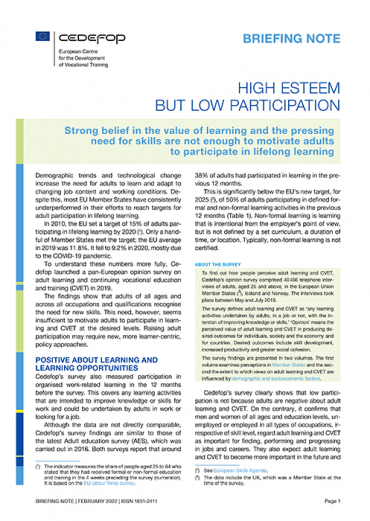While formal training is crucial, more must be done to understand better what promotes learning at work, and Cedefop is working on the European Training and Learning Survey, which investigates exactly that, the Agency’s Executive Director Jürgen Siebel told participants in a hybrid event organised by the European think tank Bruegel, on 26 January.
The event was entitled 'Up and ahead: skills for a more resilient EU workforce' and explored how people can be equipped with the skills they need to adapt to a rapidly changing labour market.
Asked why learning at work is an important complement to formal training, Mr Siebel noted that, as Cedefop’s European Company Survey suggests, smart and expansive policies on workplace learning that empower people pay off in terms of workers’ wellbeing and the corporate bottom line.
He also pointed out that Cedefop’s recent European skills and jobs survey (ESJS) shows that not all mismatch is about skills gaps or lacking skills:
'Although it has been less prominent in policy discussions, knowledge and skills underutilisation at work is also mismatch. There are substantial opportunities to expand skills utilisation at work – in other words: designing jobs in smarter ways and improving work organization, so that people are motivated and have the opportunities to use and expand their skills via learning.'
What drives CVET participation
'Upskilling people should go hand in hand with upgrading jobs and is a win-win situation,' Mr Siebel said, adding that the European Union’s comprehensive vocational education and training (VET) and skills policy framework is a real asset and a driver of progress in transformative times.
He listed four types of factors that can boost participation in continuing VET (CVET) and adult learning:
- The CVET opportunities – quality programmes, incentives, guidance, support. When Cedefop asked adults in 2019 what they think about the quality of the training in their country, only 11% perceived it as very good.
- The actual learning potential – how much ‘space’ there is to develop skills. The latest ESJS shows that 52% of EU+ adult workers need to develop their digital skills further to do their job better.
- Beliefs – whether people think learning and skills is important in general. Cedefop evidence (Opinion survey on VET) shows that adults of all ages and across occupations and qualifications recognise the need for learning.
- Awareness – whether people see their own skill development potential. Older employees, females and SME workers do not take part in adult learning and CVET because they don’t see their own skill development potential and lack incentives.
To watch a video of the discussion, please, click here.



